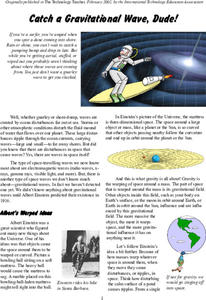NASA
From Smoke Signals to Cell Phones: Tracing How Technologies Evolve
Explore the science of space exploration. Pupils consider technological advances in propulsion, communication, power, navigation, and imaging. They select one of these areas and create a timeline of historical progress that contributed...
NASA
Water Works on a Blue Planet
Keep within a water budget. Learners find out that less than 2.5% of Earth's water is available to drink—and that there is a fixed amount of water. Scholars read an interesting article comparing the available water to a game of Monopoly...
NASA
Speaking in Phases
Hear from deep space. Pupils learn how satellites transfer information back to Earth. They learn about three different ways to modulate radio waves and how a satellite sends information with only 0s and 1s. Using sound, class members...
NASA
Blinded by the Light!
Pupils learn of multiple ways astronomers look for planets outside of the solar system. By completing a hands-on activity, scholars discover that trying to see the planets directly because of the glare from the nearby star is nearly...
NASA
Write the Book on Weather Metrics
It's not easy to measure the weather. Pupils learn about what all weather has in common—the atmosphere. Scholars discover how a meteorologists must be able to measure aspects of the atmosphere and decipher the data. They then create a...
NASA
Taking Apart the Light
Break down light into spectra. Scholars learn how atoms emit and absorb photons and come to understand how this process allows scientists to identify different atoms based on either absorption lines or emission lines. Learners then...
NASA
Catch a Gravitational Wave, Dude!
It is cowabunga time! Pupils read an article about the NASA LISA mission on gravitational waves and conduct additional research on them. The class participates in a science bowl type competition about gravitational waves. Panels of four...
NASA
Packing for a L-o-o-o-ng Trip to Mars
Pack just enough to fit. Crews determine what personal items to take with them on a trip to Mars. Each team must decide what to take with them on a two-and-a-half year trip to Mars and whether their items will fit within the allotted...
NASA
Taking a Cold, Clear Look at the Universe
Take a look with another perspective. Pupils read to find out what portion of the electromagnetic spectrum a space telescope sees and the difficulties of viewing infrared radiation from other objects in space. Individuals discover how...
NASA
Keeping Nine Eyes on the Weather
Take a look at climate change from another angle. Readers learn about the MISR instrument on the Terra satellite and how it studies Earth. Pupils experience how the multiple cameras give scientists multiple views so they can better study...
Other
Educause Review: Digital Ethics in Higher Education: 2020
New technologies, especially those relying on artificial intelligence or data analytics, are exciting but also present ethical challenges that deserve our attention and action. This is a lengthy article that discusses many issues that...
Other
Brainspire: To What Degree Is Technology and Social Change Related?
Article discussing the impact of technology on different aspects of society. Looks at education, humanitarian needs, prevention of corruption, modernization, global technological shifts, Ogburn's theory of social change, the...
Other
Critical Issue: Using Technology to Improve Student Achievement [Pdf]
NCREL provides a detailed report on the use of technology for student improvement. Click on Action Options and scroll down the area designated for teachers to view NCREL ideas on classroom implementation.
THEJournal
The Journal: Teachers Report Educational Benefits of Frequent Technology Use
Discusses a report on the use of technology in schools. The report surveyed over a thousand American educators for their thoughts on technology use. Teacher support and training were found to be key factors to successful integration of...
Other
Education World: Promoting Responsible and Ethical Digital Citizens
This article discusses ways teachers can train today's generation to be responsible and ethical life-long learners in the digital age. Topics include care of technology equipment, using reputable sites for studies and research, adhering...
FNO Press
From Now On: Stuffing Technology Into the Curriculum
This From Now On article is about the keystone of education: Sound instructional design puts learning in focus first and then matching the strategies and tools that will produce that result.
Ted Nellen
Cyber English (By Ted Nellen): Oppenheimer: The Computer Delusion
A controversial article from The Atlantic magazine suggesting that there is no evidence to show that using computers in schools improves either teaching or learning. Argues against cutting enriching programs in art and music to fund...
Smithsonian Institution
Smithsonian Education: Podcasting With Your Students
Here you can learn about ways that other teachers are doing with podcasting in the classroom. A tab on the left provides additional information about how to podcast
Massachusetts Institute of Technology
Mit: Invention of the Week: Dean Kamen: Portable Medication Technology
Here is information on Dean Kamen's education, career, and his contributions to the medical world. Learn about his "revolutionary, pocket-sized infusion pump [that] allowed patients to reeceive regulated intravenous medication."
Other
Deloitte Insights: Creating the Government of the Future
The COVID-19 pandemic accelerated - in some cases, by years - the advance of the future of government. By necessity, government's response to the pandemic resulted in rapid change of the sort generally not seen in the public sector. From...
CNN
Cnn: Cnn 10
CNN 10 provide quick news segments from around the world organized into subject categories. Content includes world events, U.S. government, science & technology, economics & math, language & fine arts, and health.
Other
District Administration: Without Boundaries
Technology is becoming more and more of an integral part of arts education. This article discusses how technology can enhance arts education by helping students explore their own creative talents.
Genome British Columbia
Genome British Columbia: Terminator Technology for Gm Crops
In 1998, American scientists developed terminator seeds which grew into plants that were unable to reproduce. While this practice prevents the dangerous flow of genes to the wild, it has some disadvantages, for example, the added expense...
Other
Study: Sharing I Pads Beats 1 to 1 Programs for Improving Student Learning
This article from Education Week discusses a study where kindergartners who shared iPads in class scored higher on literacy assessments than their peers in 1-to-1 or tablet-free classrooms. The researcher said the results suggest that...
Other popular searches
- Technology Education
- Technology Education Career
- Technology Education College
- Technology Education Metals
- Technology Education and Art
- Technology Education Design
- Technology. Teacher Education
- Technology Teacher Education















